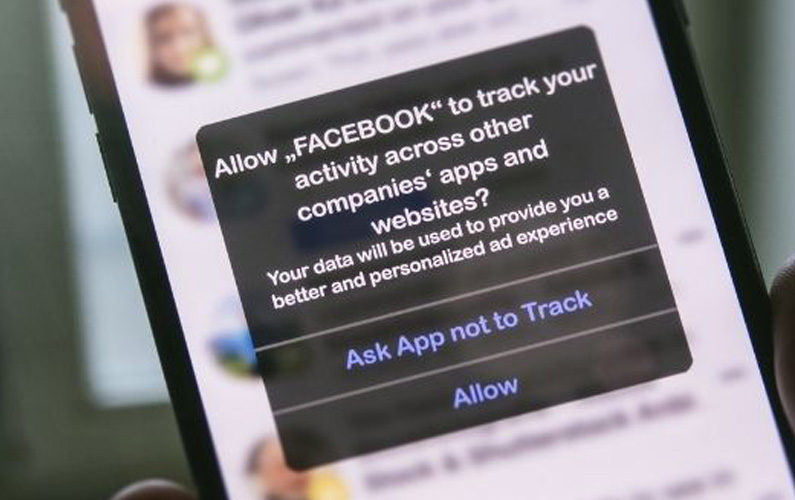Are you following the latest brouhaha in big tech? Apple made a serious privacy change and Facebook is hitting backhard.
On April 27, 2021, Apple introduced the new App Tracking Transparency (ATT) feature as part of its iOS 14.5 update. Knowing there would be pushback, Apple announced the ATT feature a year ago but delayed the launch to give app developers time to adjust.
ATT forces apps to ask users, clearly and up front: Do you want us to track your activity across other companies’ apps and websites? The app can briefly justify its reasoning for tracking and, most importantly, the user can say yes or no.
Meanwhile Facebook is going blue in the face arguing the move will hurt everything from its bottom line to small business and the free market economy. It tried using an “educational screen” that implied it would charge a fee tousers who say no to tracking, and even put its case in full-page ads in major newspapers.
Facebook isn’t the only app affected by ATT, but it is the most affected. Let’s dive in.
What does ATT do?
ATT puts user consent to cross-app tracking up front for the first time and gives the user unprecedented control over their personal data.
Every time a user opens an app for the first time after the iOS 14.5 update, a pop-up privacy prompt will tell them the app wants to track their activity across the internet, give a brief justification, and ask their permission to allow it. Thenevery app that has asked permission will appear in a tracking menu in the iOS privacy settings so the user can review and change their choice at any time, for all apps or certain ones.
Saying no to the privacy question stops cross-app tracking. This means the app can no longer use the user’s IDFA (ID for Advertising) or other identifiers such as hashed email addresses to aggregate data about the user across other apps and sites on the internet. The IDFA is a unique number Apple has been assigning since 2012 to each user’s device to knit together their data and activity across web sites and apps and build a highly detailed user profile for personalized advertising.
For the app, a ‘no’ answer will mean turning off the data tap that feeds its targeted advertising and losing a revenue stream if they sell the aggregated data to others, including data brokers. And they’re not allowed to restrict access to features for those who opt out.
In Facebook’s case, a user saying ‘no’ to tracking would have no effect on Facebook tracking what a user does on its own platform, but it would stop Facebook aggregating data about that user across other apps and sites. Clearly, it’s this aggregated data product that is extraordinarily valuable to Facebook’s ad revenue because it shows advertisers exactly what users are browsing and buying. (See Signal’s recent hilarious targeted ad campaign proving this point, which Facebook shut down.) Of course a user saying ‘yes’ to tracking would mean the app can continue its free-for-all surveillance on the user’s devices. Situation normal.

Importantly, the users who opt out will still see ads, just not as spookily relevant ones.
Prior to ATT, a user had to click on a link in their phone settings to reset their IDFA, which would interrupt data tracking. Now the ATT effectively randomizes the opted-out users’ IDFAs and breaks the tracking. Under iOS 14.5, if a user selects ‘Allow apps to ask’ under Settings > Privacy, each app they use gets to implement the ATT privacy prompt.
Highly charged emotional responses to ATT
With ATT, Apple allows apps to make their case to the user: why we’re asking for your permission for cross–apptracking. And it’s interesting to see how different companies are doing it.
When Apple first announced the change, Facebook was the most vocal dissenter and still is. Although an antitrust complaint filed in Germany against Facebook is serious stuff too.
Facebook argues ATT will be bad for not only its business but small businesses everywhere that rely on targeted (arguably more effective) advertising. They said it was a hit to the free market economy. And they even implied the possibility of a fee for users who opt out of tracking — a bullying tactic that many experts agree won’t come to passand a statement that Facebook has since clarified and denied.
The Electronic Frontier Foundation (EFF) calls Facebook’s pushback “a laughable attempt … to distract you from its poor track record of anticompetitive behavior and privacy issues as it tries to derail pro-privacy changes from Apple that are bad for Facebook’s business”.
Yes, Facebook will take a hit from ATT but it will still make ad revenue and plenty of it. Absolutely, less relevant ads will mean fewer clicks, fewer sales and less revenue. But, like Google, Facebook still has loads of first party data from which to profit, which explains why the EFF says “Facebook’s laughable campaign against Apple is really against users and small businesses”.
“Requiring trackers to request your consent before stalking you across the Internet should be an obvious baseline, and we applaud Apple for this change. But Facebook, having built a massive empire around the concept of tracking everything you do by letting applications sell and share your data across a shady set of third-party companies, would like users and policymakers to believe otherwise. Make no mistake: this latest campaign from Facebook is yet another direct attack against our privacy and, despite its slick packaging, it’s also an attack against other businesses, both large and small,” the EFF article notes.
Of course Facebook’s is just one perspective and other companies are using various emotive techniques to justify tracking and to encourage (bully?) users into selecting ‘allow’ at the ATT privacy prompt. Copping heat right now is Canada’s Weather Network app that’s using fear without any justification to make users agree to tracking.

Our position on ATT
With ATT, Apple is giving users more visibility about tracking and more power to opt out. We feel these are legitimate steps by Apple to enhance consumer privacy. They’re in touch with the consumer mindset around privacy and they’re responding.
But of course Apple also has the luxury of making this change without disrupting its own revenue streams. As a primarily hardware business, Apple can readily choose this as a battleground. Apple may be doing this to disrupt Google, and Facebook is just hefty collateral damage.
What the early opt-out stats say
Early stats from Branch Metrics on Twitter say, of the people who had the “Allow apps to request to track” box checked in iOS 14.5, only 4% of users allowed tracking. That means 96% of people didn’t want tracking. For those who argue that generally users want tracking, these stats are strong rebuttal.
What we recommend
We’ll always recommend that you answer ‘no’ to the ATT privacy prompt. Disabling cross-app tracking is good for your privacy. Do it!
ATT is clearly a huge leap for data privacy but it doesn’t stop tracking within a single app (remember, it’s only for cross-app tracking). You still need MySudo to keep your personal data compartmentalized and protected across different services. Take 90 seconds to learn how.
Photo By Alexander Kirch



